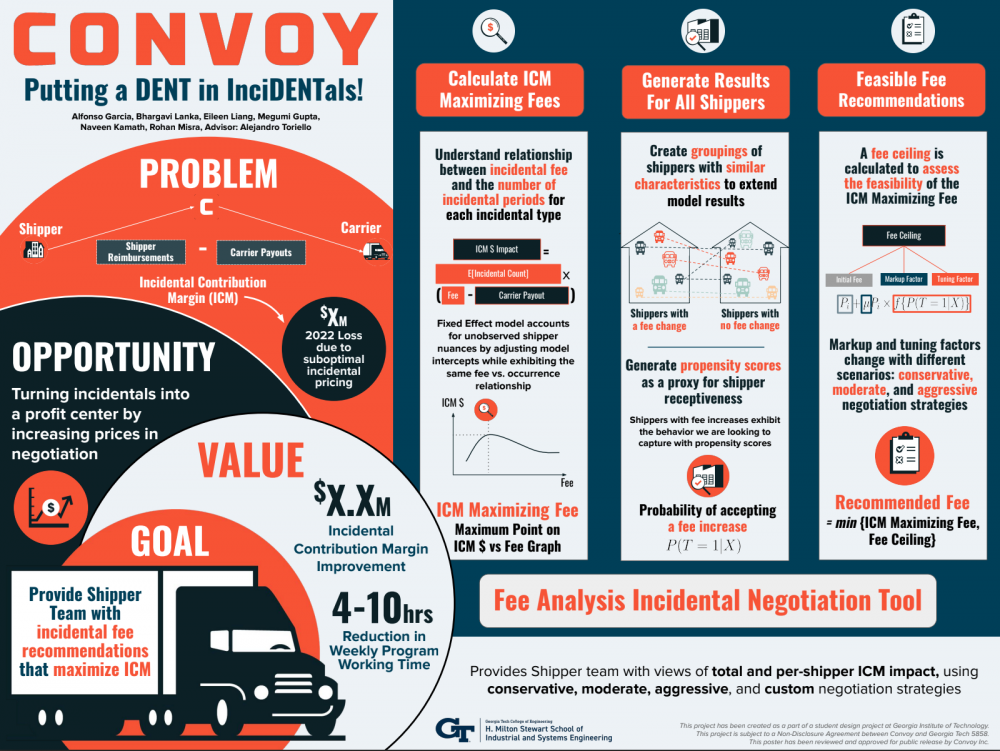Client Context
Convoy is a digital freight broker that connects shippers with carriers. Shippers refer to companies that require freight transport and carriers execute on delivery. Contracts are established with both shippers and carriers that outline business terms and obligations. Carrier contracts meet industry standards and leave little room for change. Conversely, shipper contracts are heavily negotiation-based. Each shipper contract has two parts: general level of business (primary) and incidentals (secondary). When an incidental, or unplanned shipment complication or delay, occurs, Convoy compensates the carrier (carrier payout). If the cause of the incidental can be attributed to the shipper, they pay Convoy the fee specified in their contract (shipper reimbursement). The Incidental Contribution Margin (ICM) is a key metric in determining incidental impact and is calculated as the difference between shipper reimbursements and carrier payouts.
Project Objective
Previously, Convoy has focused on primary contracts as the driving component to growing margins and gaining market share within the digital freight space. However, there have been recent efforts to prioritize secondary incidental policies because of the potential for ICM to improve Convoy’s bottom line.
Given how ICM is calculated, it is possible to shift incidentals from a variable cost component to a profit center if shipper reimbursements exceed carrier payouts. As carrier payouts are fixed and follow industry standards, the team sees an opportunity to maximize ICM through shipper reimbursements. The most effective way to realize this opportunity is to provide the Shipper Team with recommended incidental fees that maximize the ICM.
Design Strategy
There is a tradeoff between incidental fees and corresponding incidental frequency. Shippers may be incentivized to reduce operational inefficiencies that lead to incidental occurrences to avoid high penalties. Thus, a maximum ICM value can be achieved through an optimal combination of incidental fee and incidental occurrence at that fee. Any fee above this target would decrease the corresponding ICM dollar impact.
There are inherent risks in recommending the ICM maximizing fee. Convoy’s leverage in incidental policy negotiation varies across shippers depending on factors such as shipper size or length of the relationship with Convoy. The shipper relationship is only truly known by the Account Manager (AM) responsible for that contract negotiation. Furthermore, Convoy has expressed that priority remains with primary contract terms; incidental policy negotiations should not compromise shipper relationships.
To mitigate these concerns, the team introduces three separate fee recommendation scenarios to be used in the negotiation process at the AM’s discretion. The three scenarios can be employed based on Convoy’s level of risk tolerance with a particular shipper: conservative, moderate, or aggressive.
Deliverables
The final deliverable is a Fee Analysis Incidental Negotiation Tool (FAINT) to be used by Convoy AMs during incidental fee negotiations. The tool allows AMs to select a shipper and their preferred negotiation strategy for the shipper: conservative, moderate, or aggressive. The corresponding outputs are a recommended fee, the ICM maximizing optimal fee, the current contract fee, and both shipper-specific forecasted ICM impact and aggregate ICM impact, broken out by incidental type. FAINT also allows for custom fee input, adding customization and flexibility to the tool that allows AMs to tailor the fee structure to their specific needs during a negotiation.
Throughout the negotiation process, AMs are now provided with real-time estimates of the ICM impact broken down by incidental type and the tradeoffs between prioritizing different incidentals. For instance, if the tool provides the visibility that detentions constitute the majority of a shipper’s ICM impact, an AM may prioritize a dollar increase to the detention fee over any changes to other incidentals. The tool also includes a date input field that allows AMs to input the effective date for charging new fees. This field accounts for varying timelines for contract expiry and renegotiation, and it adjusts the incremental margin accordingly to more accurately forecast the ICM impact of fee changes.
Value and Impact
After determining recommended fee targets for all shippers, FAINT maps incremental margin projections for each incidental type onto 2023 shipment forecasts provided by Convoy’s Financial Planning & Analysis team. Incremental margins suggest that Convoy’s incidental margin would nearly break even under moderate assumptions.
FAINT has been piloted across several Convoy teams, and has received positive comments about the ease of use and the convenience of the tool. The program manager for incidentals at Convoy has cited a reduction of four to ten weekly working hours due to the automation of margin impact analysis.


